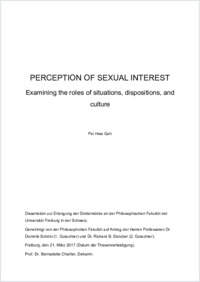Perception of sexual interest : examining the roles of situations, dispositions, and culture
- Goh, Pei Hwa
- Schöbi, Dominik (Degree supervisor)
-
2017
1 ressource en ligne (142 p.)
Thèse de doctorat: Université de Fribourg, 2017
English
This thesis incorporates a set of empirical studies addressing different perceiver-based predictors of sexual interest perception. We first tackled the question: what is the psychological function of perceiving sexual interest? Daily diary data (N = 84) from the first study in Chapter 3 revealed that perceiving sexual interest was associated with increases in momentary self-esteem. However, this depended on the relationship status of the perceiver and the person from whom they perceived sexual interest. Perceiving sexual interest from any other person boosted the state self-esteem of perceivers who were single but not for those who were in a relationship. People in a relationship only reported self-esteem boosts after perceiving sexual interest from their current relationship partner. We suggested that, in line with the sociometer theory (Leary, Tambor, Terdal, & Downs, 1995), self-esteem may also function as a gauge of how well one’s reproductive needs are being met, with sexual perceptions as input. On the basis of these findings, it was posited that perception of sexual interest may represent one important, albeit tenuous, resource that contributes to the development of good mate value. The following investigations were, thus, grounded on the proposition that situations and dispositions that afforded reward pursuit (rather than threat aversion) would increase individuals’ perception of sexual interest, presumably as a means to satisfy reproductive goals or mating needs via the accumulation of mate value. The second aim in the studies presented in Chapter 3 was to examine how self-esteem, as a trait, would shape sexual perceptions. According to the risk regulation model (Murray, Holmes, & Collins, 2006), trait self-esteem guides people’s sensitivity to social risks and rewards; in that people with high self-esteem are more motivated to pursue rewards (e.g., to connect with others, to recharge or build up mate value) because they possess a psychological resource that acts as a protective shield against social risk. Those with low self-esteem, however, lack such resources and therefore prioritize the avoidance of the consequences associated with social risks. As predicted, we found that people’s general level of self-esteem predicted increased sexual perceptions. As a follow-up to the findings in Chapter 3, the studies presented in Chapter 4 examined whether holding power – a situation that promotes reward pursuit – would also heighten sexual perception. Results from 3 experiments (Ns = 529) with Swiss military samples revealed that male military members reported higher estimations of sexual interest from a female military member when they held a higher military rank relative to the female target, compared to those holding either an equal rank or a relatively lower rank. Additionally, the power effect was not present among individuals who were hypersensitive to rewards by disposition, as they already perceived high sexual interest in general. Power only increase sexual perceptions for those who were low-to-moderately sensitive to rewards. Results from the studies in Chapters 3 and 4 support our proposition that sexual interest perception would increase in situations and dispositions that afford goal pursuit and decrease in those that trigger threat aversion. What about situations that do not provide the perceiver a so-called psychological insurance against risks (which power and high self-esteem offer), but instead just seems to be perceived as safe, rather than dangerous? For instance, one’s mood has been proposed in prior research to function as a signal of the conditions of his or her current environment. A positive mood indicates safety while a negative mood indicates a presence of threat. Given this, the final study (Chapter 5) examined if people perceive more sexual interest when they are in a good mood and less when they are in a negative mood. Experiments involving mood induction procedures were conducted on university students in Switzerland and Malaysia (Ns = 234). The results of this experiment revealed that negative mood significantly reduced men and women’s estimations of sexual interest, but not for Malaysian participants. Further analyses showed that the difference in mood effects in perception between the two samples could be explained by differential endorsement in sociocentric values; people who highly valued social harmony and stability (such as the Malaysian sample) were not significantly affected by their mood when making sexual judgments. Taken together, the results from the current work imply that sexual perception may be better understood as a situation-varying, individual-varying, and culture-varying phenomenon rather than simply being examined as a gendered one.
- Faculty
- Faculté des lettres et des sciences humaines
- Language
-
- English
- Classification
- Psychology
- Notes
-
- Ressource en ligne consultée le 30.05.2017
- License
-
License undefined
- Identifiers
-
- RERO DOC 288834
- URN urn:nbn:ch:rero-002-116182
- RERO R008659021
- Persistent URL
- https://folia.unifr.ch/unifr/documents/305376
Statistics
Document views: 693
File downloads:
- Texte intégral: 196
